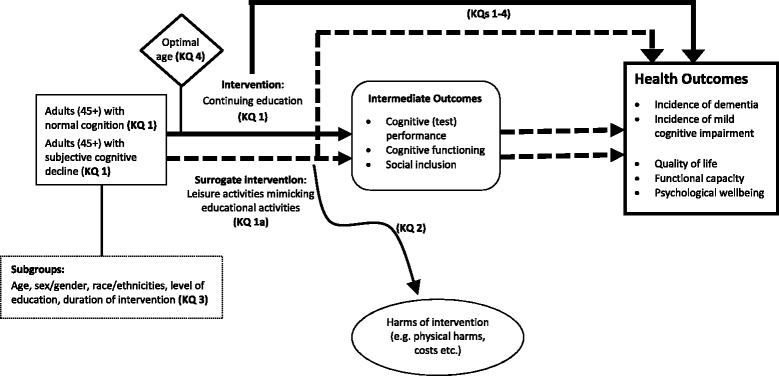Continuing education for the prevention of mild cognitive impairment and Alzheimer's-type dementia: a systematic review protocol
- PMID: 28789697
- PMCID: PMC5549351
- DOI: 10.1186/s13643-017-0553-0
Continuing education for the prevention of mild cognitive impairment and Alzheimer's-type dementia: a systematic review protocol
Abstract
Background: Because of the enormous social and economic burden of disease, the prevention of mild cognitive impairment and Alzheimer's-type dementia has become a major global public health priority. Studies show that cognitively stimulating activities during middle adulthood might have a protective effect on the brain by boosting the cognitive reserve. The aim of this review is to identify evidence investigating the effects of continuing education for the prevention of mild cognitive impairment and Alzheimer's-type dementia in late life.
Methods: Our approach employs a two-stage design: First, we will conduct a systematic review to assess the preventive effects of continuing education on mild cognitive impairment and Alzheimer's-type dementia. Second, because we expect to find few studies, we will perform a review of systematic reviews on leisure activities that mimic formal continuing education to determine their effects on the prevention of mild cognitive impairment and Alzheimer's-type dementia. We will search electronic databases (e.g., MEDLINE, PsycINFO, EMBASE, CENTRAL, CINAHL, and Scopus) for published studies and gray literature databases (e.g., trial registries) for unpublished studies. Two authors will independently screen abstracts and full-texts using pre-defined eligibility criteria, select studies, extract data, and assess the quality of included studies or reviews. Outcomes of interest include the incidence of mild cognitive impairment or Alzheimer's-type dementia, quality of life, functional capacity, and psychological wellbeing. Intermediate outcomes are cognitive (test) performance, cognitive functioning, and social inclusion. The review team is a multidisciplinary group consisting of methodological experts and dementia, geriatrics, and continuing education researchers.
Discussion: We anticipate that our review will highlight serious gaps in the current evidence. Results will build the basis for further research regarding the relation of continuing education and cognitive decline and dementia.
Systematic review registration: PROSPERO CRD42017063944.
Keywords: Alzheimer; Continuing education; Dementia; Mild cognitive impairment; Prevention; Systematic review.
Conflict of interest statement
Authors’ information
The systematic review is a multidisciplinary project performed at the Danube-University, Krems. NM is a MD (medical doctor) working in the Department for Evidence-based Medicine (EbM) and Clinical Epidemiology, and IK with a MSc in cultural studies is an information specialist. SA is a professor of dementia research and clinical psychologist. CG is a professor of geriatrics working at the Center for Geriatric Medicine and Geriatric Nursing. FKA is a post doc researcher at the Department for Continuing Education Research and Educational Management. MK is professor and head of the Department for Continuing Education Research and Educational Management. GG is MD, MPH, professor of epidemiology and head of the Department for Evidence-based Medicine and Clinical Epidemiology.
Ethics approval and consent to participate
Not applicable.
Consent for publication
Not applicable.
Competing interests
The authors declare that they have no competing interests.
Publisher’s Note
Springer Nature remains neutral with regard to jurisdictional claims in published maps and institutional affiliations.
Figures
References
-
- World Health Organisation (WHO). Dementia: A Public Health Priority. 2012. http://apps.who.int/iris/bitstream/10665/75263/1/9789241564458_eng.pdf?ua=1. Accessed 20 Apr 2017.
-
- World Health Organisation (WHO). The epidemiology and impact of dementia. Current state and future trends. 2015. http://www.who.int/mental_health/neurology/dementia/dementia_thematicbri... Accessed 17 Apr 2017.
-
- Alzheimer’s Association. Alzheimer’s disease facts and figures. 2016 http://www.alz.org/documents_custom/2016-facts-and-figures.pdf. Accessed 12 Apr 2017. - PubMed
-
- Prince M, W.A., Guerchet M, Ali G-C, Wu Y-T, Prina M. World Alzheimer Report 2015- The Global Impact of dementia. An analysis of prevalence, incidence, costs and trends. 2015. https://www.alz.co.uk/research/WorldAlzheimerReport2015.pdf. Accessed 10 Mar 2017.
-
- E Reynish, L.F., M Prince, H Bickel, A Kiejna, J Georges. EUROCODE Prevalence of dementia in Europe. 2006. https://ec.europa.eu/health/archive/ph_information/dissemination/disease.... Accessed 6 Mar 2017.
Publication types
MeSH terms
LinkOut - more resources
Full Text Sources
Other Literature Sources
Medical


